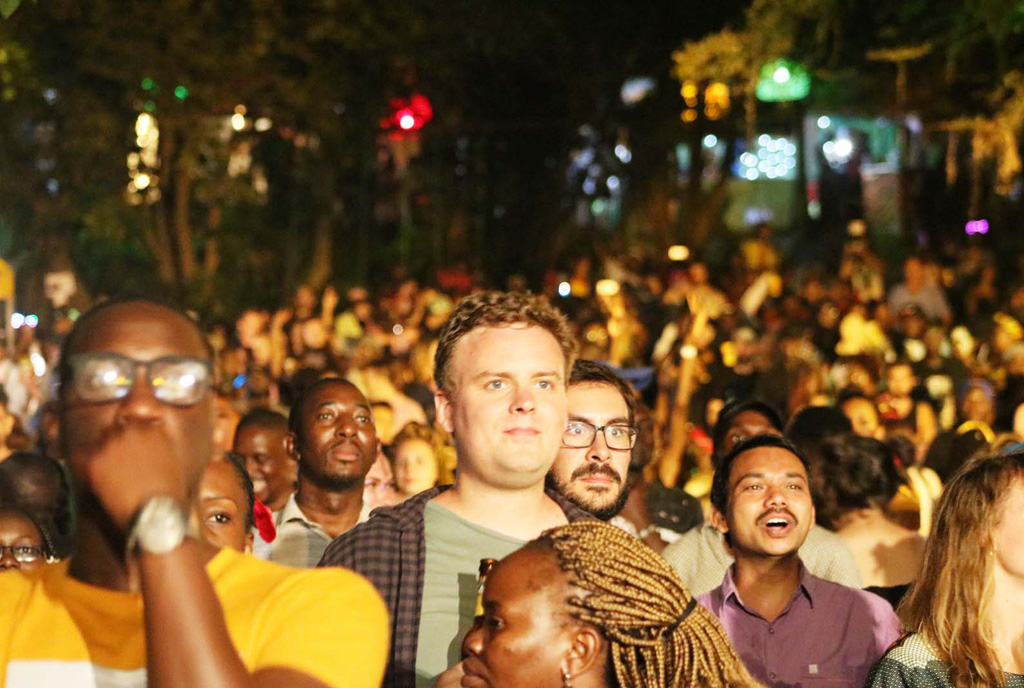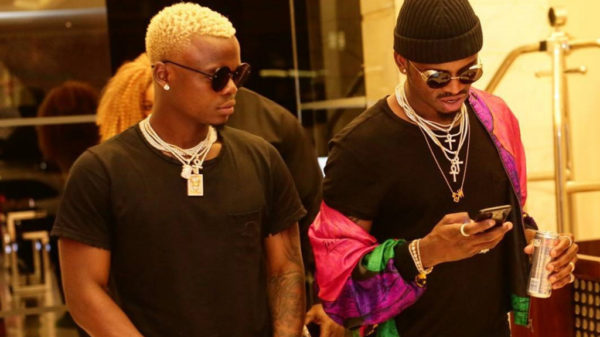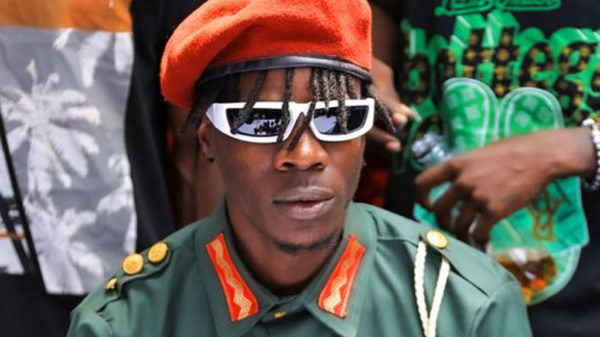
The Party People dancers perform during last year’s Buzz Leavers’ Rock at Garden City Rooftop. Their dance is free style. PHOTO BY RACHEL MABALA
Dance people: Dakiti Juma, alias Deejay, Timothy Kasedde, alias Ras Timo, Abdurahman Sharif Ssekiranda, Bryan Ojambo, Henry Kayunga and Ref deejay, the official deejay make up Party People, a group that earns a living through dance. They have been doing this for the last nine years. Isaac Ssejjombwe caught up with them to discuss their love for dancing.
How did you all guys meet?
Henry Kayunga: We met in 2008 at Makerere University. We were not in the same year but we ended up joining forces through dance, which we officially started doing in 2009.
How did it all start?
We started doing this just for formality, calling each other up just to hang out. The first video we featured in was Ray Signature’s Kasenyanku. It was just the three of us; Deejay, Timothy and Sharif. Then Henry came on board and we featured in the second video, an all-star combination including Salvado, Keko, Ray Signature among others. This was an eye opener that saw the birth of Party People, a name we derived from our partying ways.
Initially we were four but one of us decided to start up his other business. Later, Henry joined us, then Allan Kanyike, Ref Deejay, Gaddafi and others.
Each of you must have a history in dancing…
Dakiti Juma (Deejay): In my younger days, I used to dance to a lot of Lingala music. My brother used to collect Kanda Bongoman, Awilo Longomba, Arlus Mabele, Pepe Kale and many others. I got exposed to the dancing style through primary school. In high school we used to break dance and do a lot of Jaba at London College and when I joined Mbogo High, I combined Lingala and Break dance. Soon, dancehall music took over, during the times when Red Rat, Mr Vegas and many others.
Brian Ojambo: My father was an ardent Lingala fan and he used to force us to listen to his radio all the time. But I had three elder brothers who preferred different genres. One loved Hip hop, another dancehall and the other liked local music. The one I followed was a ragga artiste, so he would bring home new dancehall tracks every day. I liked this style of music from the age of eight. And when I got to secondary school, I started following dancehall groups such as TOK, but guys used to praise Father Bogle, a Jamaican music legend. So my brother got me his documentaries. I took it upon myself to learn his styles till today.
Timothy Kasedde alias Ras Timo: Just like Dakiti, I also loved Lingala when I was younger. My little brother, was however, better at it. I did not dance much in my primary school though, because I was a good sportsman; playing cricket, volleyball and others. When I got to P.6, sports become a burden, so I joined breakdancing upto Senior Three when I linked up with Bryan Ojambo and he pushed me into dancehall music. I have been doing that style to date.
Henry Kayunga: If you notice, we are in the same age bracket, which explains our historical background in dancing. We all grew up in the Lingala generation but my story is a bit different because where I grew up, we would dance for local brew drinkers for money. It is from here that a man called Dan spotted me and enrolled me in a traditional cultural dance group in Mulago, where I was active upto my Senior One when I developed interest in dancehall. I started practicing and in my Senior Three, I participated in a dance competition with my brother. The event was organised by KPC but I did not know. When our turn came, we chose the song ‘Burn It Up’ by R. Kelly and our school, St Margret, was disqualified. I didn’t give up.
How many people are part of this group?
The group comprises many people but the public is familiar with only four members. We have two managers, an official deejay, three marketing managers and other promoters.
Do you have a leader in this group?
We are all leaders in the dance group, because each of us has bright ideas to contribute to the group. For example, Bryan is our creative guy, Timothy looks for jobs, Deejay makes sure that whatever the group discusses comes to pass and Henry ensures that the group’s stage routine or performance is followed.
What inspires your dance strokes?
We derive our moves from Bogle. We learn from his dance moves and add some of our own to spice things up. But his moves give us the basics to create our own.
Besides Bogle, where else do you get the moves?
We get our moves from any situation, even drunkards in bars. All it takes is one glance at a move by any ordinary person. An example is Desire Luzinda’s famous pose so we created the desire dance from that.
Do you have a specific name for your dance styles?
It is basically the ‘dancehall dance’ but that aside, everyone has their individual dance style, for example jump and skip, John Paul, Gawunde, Shuffle, Rona dance, Point dance. Every stroke has a dance but people have not realised that yet.
How much do you charge to perform at an event?
There is only one answer to that question; dancing is expensive. We don’t have a fixed price. We charge basing on how long we perform. There are also incidences where it’s an artiste who wants us to feature in his or her song. We can’t charge them the same amount as an ordinary person because by featuring in the video, we are helping each other. There is always room for negotiations.
We have seen dance groups in Uganda break up for different reasons. What has united you for this long?
We are focused and our friendship is not all about money because that is what usually causes groups to break up. We linked up because we were dancers. We respect each other and always learn from ourselves. We share to make ourselves better. Our friendship is based on passion. If you notice, there are videos that feature one of us dancing and that represents us all. Communication also matters.
Why are there no girls in this group?
Some situations are too hard for girls. Our journey from the beginning has been hard and long. We reached an extent of just dancing to be recognised, which would be hard for a girl to understand. But we can work and have worked with some girls.
What is the price for joining your group?
Joining is easy as long as one has the passion we have, which is not so easy, going by the years we have been together and how we connect. It is so easy for us to dance different routines even if we take weeks without seeing each other.
So you guys decided to concentrate on dancing all your life?
We have side businesses, but when it is entertainment time, that is where all our focus will go.
You guys do exactly the same stuff as other popular groups. Don’t you sometimes feel the pressure?
No we don’t. In fact, . We interact with most of the dance groups in Uganda. We have respect for other groups because we are in the same life.
What challenges have you faced since you started out?
In the beginning, people did not believe in what we were doing and that affected us so much. We were even abused because we did not have uniform and because every member came on stage doing a different routine. However, what people did not realise is that our concept since was to do things in free style.
How different are you guys from the rest of the dance groups in Uganda?
When we had started out, our main aim was to do something totally different. That is why we do not have a uniform. Before we decide to make the audience happy, we have to be happy ourselves and that makes our moves flow. As Party People, we do free-style. We can dance to any song at any given time. We do not have to first rehearse.
What are some of the videos you have featured in so far?
Gila Tujile and Ssejusa by Mun G, Ndeku (Roden Y), Kasenyanku (Ray Signature), Sesa, Njela and Mikonkome (Vampino), Champion (Mun G and Naava Grey), Come Over, Olekibango by Ragga Dee, Tunywe by Sheebah, among others and in all those videos, the dance routines are different.
Do you have a limit in you dancing?
That would depend on the organiser of the show because we can even dance for two hours non-stop.
What is that one event you have performed at and sticks out as the most memorable?
That is a tricky question because we have struggled to be part of many events yet when we get on stage, the audience applauds us. We have performed at Buzz events, Sean Paul, Club Mega Fest and many others. So every event is memorable.
What should your fans expect this year?
Party People is not just a dance group. We are a company and our plan is to start up a studio, a deejay academy and mid this year, we plan to do a dance evasion event.
What legacy do you want to leave behind?
The same legacy we started with when beginning Party People, which is changing the trend of dance in Uganda.
























































